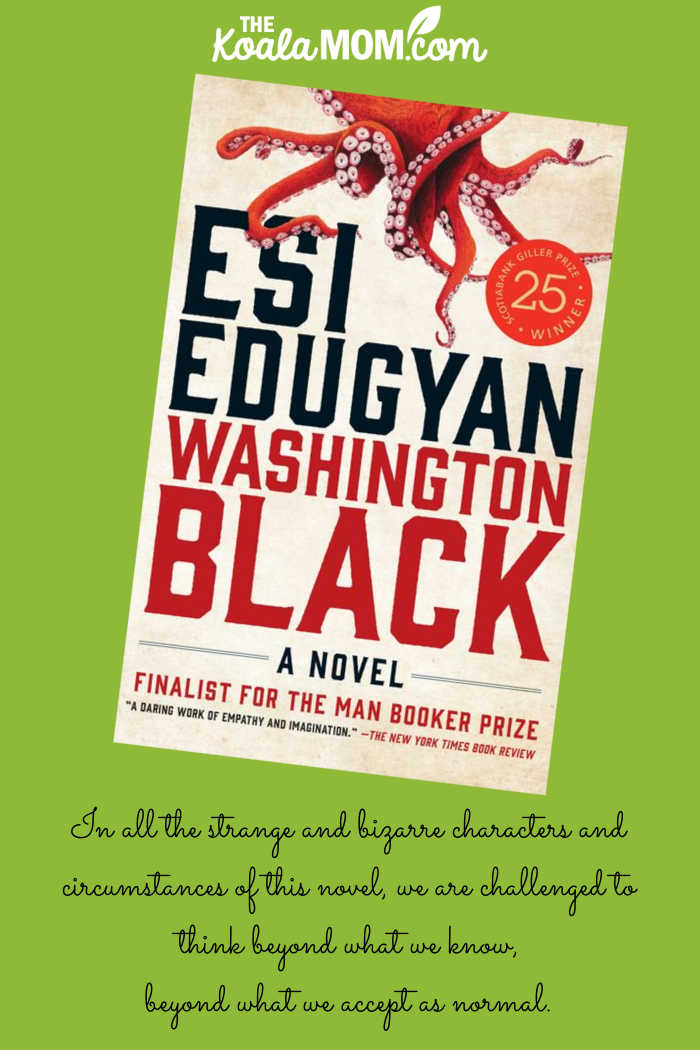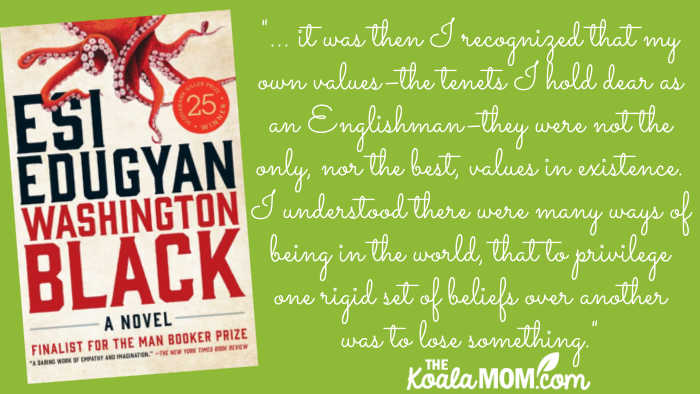At the start of my second year at the University of Victoria, there was great excitement throughout the writing department because a graduate’s novel had won the Giller Prize. Esi Edugyan’s second novel Half-blood Blues was shortlisted for four prestigious awards that year and more the next. Her husband, Steve Price, was my second-year fiction class instructor, and while he said little about his personal life, his pride and love for Esi shone through.
Half a dozen years later, Edugyan’s third novel was also shortlisted for and won the Giller Prize. Esi is only the third Canadian author to have won the Giller Prize twice. I recently picked it up at my library and tried to find time to read it without renewing it too many times. Washington Black is the story of a slave born on a plantation in Barbados who then travels to the US, Arctic, Canada, and Britain.

This post contains affiliate links; as an Amazon associate, I earn from qualifying purchases.
Washington Black overview
Washington tells his story in the first person, starting with his childhood in Barbados. He’s one of the field slaves and has a close relationship with another slave, Big Kit. One day, when the plantation owner’s brother comes to visit, Washington is pulled from his life in the fields and becomes the brother’s personal slave. Titch attempts to treat Washington as an equal, teaching him to read and to use his scientific instruments as well as to cook. Washington helps Titch build his flying machine high on a hill above the plantation.
Then the arrival of a cousin with startling news from England changes everything. Titch and Washington go on the run, arriving by boat in the US to see another scientist. Titch gives Washington the chance to head to Canada via the Underground Railroad, but Washington refuses. They then head north to the Arctic to find Titch’s father and determine whether the rumor of his death is true or false.
When Titch disappears in the Arctic, Washington is left to find his own way. He reaches eastern Canada and works odd jobs until he meets the Goffs. Mr. Goff is a British scientist and the author of a book Titch had Washington study; his daughter is just older than Washington, with unusual freedom for a woman of her day. As Washington and Tanna fall in love, Washington also helps the Goffs with their scientific research. However, Washington’s past continues to haunt him, particularly the question of what happened to Titch on that day in the Arctic.
My thoughts on Washington Black
Washington Black came out of a strange confluence of interests – a fascination with a Victorian-era criminal trial centering around the disappearance and supposed resurrection of the wealthy scion Roger Tichborne; an interest in 19th-century scientific conventions, especially the cataloguing and depiction of marine creatures; the realities of plantation life in Barbados; the classic bildungsroman journey from innocence to experience. The research could have gone on forever – looking at old documents online and in libraries, reading memoirs and histories and scientific treatises and the novels of Jules Verne. And of course, returning to Morrison’s Beloved. ~ Esi Edugyen, interview
This novel gives readers an unusual perspective on the era of slavery in Barbados. Edugyan doesn’t sugar-coat any of the cruelty and violence that the slaves endured, particularly under a cruel, harsh master like Washington Black’s. The Wilde brothers are contrasted in their treatment of the slaves, but we come to realize that even Titch’s attempts to treat Washington as an “equal” fall short. Washington spends his life marked by not only his skin colour but a terrible accident suffered as a child, pursued by a man who sees him only as property to be returned.
Through her characters, Esi confronts the ways in which we view the world around us and even what we know of history. Often, our perspectives are narrow, based on what we’ve been taught or the other books we’ve read. Goff tells Washington about some of his travels and relates his attempt to tell a group of islanders about his sister’s suicide, and his surprise at their reaction:
It was I who had failed in my understanding, you see. Life holds a sanctity for them we can scarcely begin to imagine; it therefore struck them as absurd that someone would choose to end it. A great ludicrous act. In any case, it was then I recognized that my own values–the tenets I hold dear as an Englishman–they were not the only, nor the best, values in existence. I understood there were many ways of being in the world, that to privilege one rigid set of beliefs over another was to lose something. Everything is bizarre, and everything has value. Or if not value, at least merits investigation.
In Washington’s travels from sunny, hot Barbados to the cold, barren Arctic and places in between, we see this need to keep learning and growing, to accept others for who they are, and to have an open mind. Washington is constantly judged not just for his skin but also for his scars. Titch, the Goffs, and a few others treat him as “equals,” but even Goff doesn’t think Washington is “good enough” for his daughter. In all the strange and bizarre characters and circumstances of the novel, we are challenged to think beyond what we know, beyond what we accept as normal.

I also noticed that Washington is silent through much of his story. Although he is the narrator, he rarely speaks himself. He listens to long dialogues from Titch, Titch’s father and others, but his own responses are usually short or even absent. In the narrative, we hear his questionings, his attempts to understand his world and what he sees. However, even when he is with his few friends, he often remains silent, unable to fully express what he’s thinking or feeling. This silence, more than anything, conveys his past trauma to me, his feeling of being unheard and voiceless as a slave in his childhood, and never being fully able to overcome that.
Towards the end of the novel, when he meets Titch again, he asks his former master and mentor, “What is the truth of any life, Twitch? I doubt even the man who lives it can say. You cannot know the true nature of another’s suffering.” Titch answers him, “No. But you can try your damnedest not to worsen it.”
That, I believe, is the crux of Washington Black. While novels are the best ways to “walk a mile in another’s shoes” and to experience Washington’s life with him, we are still an arms’ length away from him, able to put the book down at any time. We can pat ourselves on the back that slavery has ended and people no longer endure what happened on Faith Plantation in Barbados, but that would only make us blind to the fact that suffering continues to exist all over the world. Even if we cannot fully understand the suffering around us, we can follow Titch’s advice to avoid worsening it and to help those who are suffering to find help and healing.
More about Esi Edugyan
Esi was raised in Calgary, Alberta by parents from Ghana. She has a B.A. in Writing from the University of Victoria and a Master’s degree from Johns Hopkins University. Esi is the author of three novels and one nonfiction book. She is married to fellow UVic graduate and novelist Steven Price and they have two children. They make their home in Victoria, BC.
I’m constantly researching and trying new things when writing. I do read and research widely before I start writing to figure about what’s going on in the first quarter of the novel. My husband is also a writer; he might read half a draft and make a suggestion and that sends me off in a different direction. Because this book began on the plantation, there was a lot of reading about plantations and conditions in the Caribbean. I found a few detailed and interesting books that focused on Barbados. ~ Esi Edugyan, CBC interview
Washington Black is available at Amazon, your local bookstore, and your library.

No Responses Yet